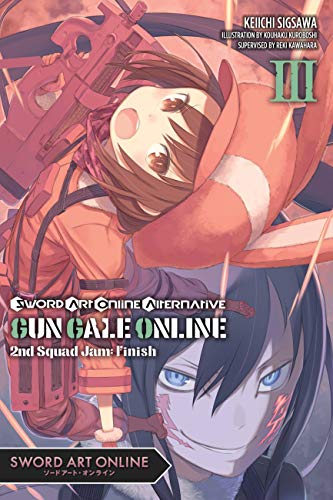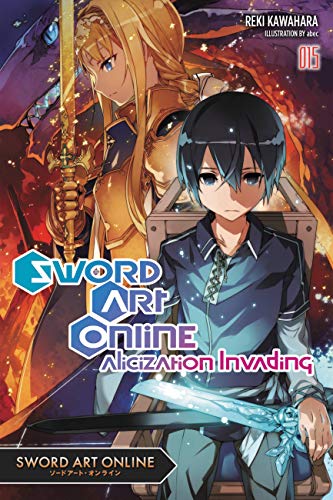By Keiichi Sigsawa and Kouhaku Kuroboshi, based on the series created by Reki Kawahara. Released in Japan by ASCII Mediaworks. Released in North America by Yen On. Translated by Stephen Paul.
This volume picks up where the last one left off, showing us the bulk of the 2nd Squad Jam, featuring most of the teams we saw in the last one plus a few new ones. The bulk of the book is, of course, the audience waiting for the big fight between Llenn and Pitohui. I say “audience” rather than reader as a large part of this book takes place in a bar in the virtual GGO world, where non-participants and the newly killed can gather to watch what’s going on and cheer people on. It’s a fun conceit, and helps to break up long pages of descriptions of action/descriptions of guns. Moreover, while our heroes are still the stars, the other teams also get a lot of great things to do (provided you like action – I mean, this is never going to be anything but “OMG, GUN FIGHTS!”) and show off their cool sides. And we meet a couple of characters I expect will pop up again in the future.
I don’t think I’ve ever seen an author quite so gleeful about playing around in someone else’s sandbox as Keiichi Sigsawa is here. (He even writes himself in to have a pathetic “I get killed off” cameo – again.) Theoretically there should be an impending feeling of doom around the events in this game – after all, Pitohui is gaming it so that it may have real-life consequences – but honestly, you rarely get that sense because you’re too busy watching everyone have all the fun in the world. Miyu/Fukaziroh greatly helps here, and I love her addition to the cast so much – aside from being a classic “just cannot shut up” type, she’s a great foil for Llenn. Her crowning moment may be emulating the Black Knight in Monty Python when she gets her hands and feet shot off and still crawls along to try to do some damage.
The battle between Llenn and Pitohui is the climax of the book, with everything else as a mere epilogue (including the actual results of the game, which I found hilarious). Llenn’s desperation to think of something, anything in order to kill off Pitohui herself is admirable and also a bit laughable, especially when she gets stuck in a thinking mantra. She’s at her best when running on instinct, though, and when her gun finally breaks (again, and yes, it still speaks to her), she has her knife, and then a makeshift knife, and then… well, I was impressed, let’s leave it at that. After that sort of battle, the epilogue was a bit of a letdown, especially with the lamest attempt at a fakeout ever – and to be fair, Karen does not fall for it even one iota. Now that Llenn and Pitohui have resolved things, though, what’s next? A third jam? Can we combine the four leads and have the best team ever?
This is still the light novel equivalent of a sugar rush, and I recommend skipping the gun nerd prose unless you really care a lot more than I do. But otherwise the GGO spinoff offers the finest quality action you’ll see in some time. Certainly better than the main series, and I think Kawahara would likely agree.





